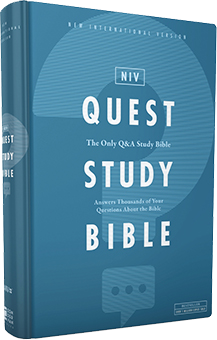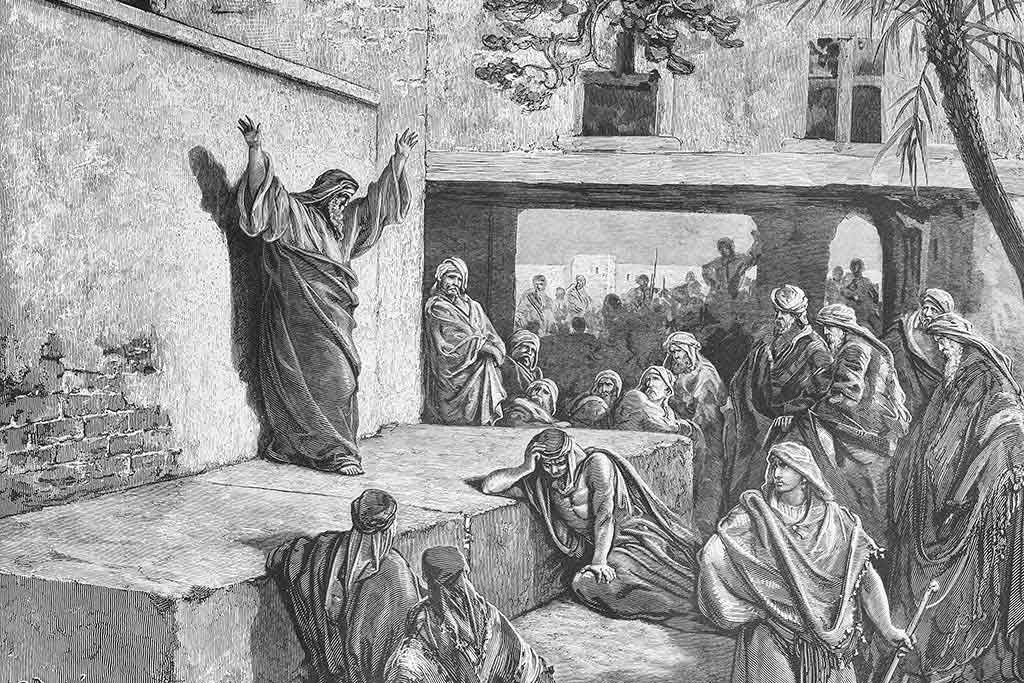
Understanding the Bible: Answers to Common Questions
The Bible is certainly one of the most influential and most widely read books in history, but it can also be confusing, especially for those who are new to it. While millions have found within its pages the key to hope for today and for the future, others open it to find too many words that relate obscure stories that seem to have little meaning for or application to the lives we live today.
There are many ways to gain a better understanding of what the Bible says and what it means for today. First of all, the stories in the Bible are, in a saying that is commonly attributed to several sources, “shallow enough for a child to wade in and deep enough for an elephant to swim in.”
In other words, many of the Bible’s stories and teachings can be taken at face value. But the words of Scripture also have such deep implications for our lives and our eternal souls that humanity will never plumb those depths. As the author of the Gospel of John writes, “Jesus did many other things as well. If every one of them were written down, I suppose that even the whole world would not have room for the books that would be written” (John 21:25).
Bible publishers like Zondervan produce study Bible products that in many ways try to provide helpful explanations for and inroads into the text. In a sense, the Bible itself is like a busy interstate, and those who produce Bibles with study notes are trying to provide “onramps” to that content that allow people to navigate the different stories and teachings in the Bible.
One such project that seeks to answer the questions many have about the Bible is the NIV Quest Study Bible, which sets its study notes up as answers to actual questions that were pulled together by the staff of Christianity Today. With editions for adults, teens, and children, the Quest Study Bible series is a great way to start getting answers to your many questions about the Bible.
But let’s start at the beginning in this particular blog post.
1. What is the Bible?
The Bible is a collection of religious texts that Christians believe to be the inspired word of God. It is divided into two main parts: the Old Testament, which contains texts sacred to Judaism, and the New Testament, which focuses on the life and teachings of Jesus Christ and the early Christian church.
The stories and teachings in the Old Testament start at the beginning of creation with the account of Adam and Eve and their experience in the Garden of Eden. The New Testament tells the story of the life and teachings of Jesus, and the Bible ends with a summary of what God intends for the end of human history in the book of Revelation.
There are multiple types of literature in the Old and New Testaments. Understanding the different genres of biblical literature can help the reader start to understand what messages the different books were intended to convey.
1. Law: The books of Genesis to Deuteronomy include the first five books of the Bible, which mirror the books of the Jewish Torah. These form the foundation for understanding all that will come in the rest of the Bible; and studying them builds an important foundation for understanding all that follows them throughout the rest of the Bible.
2. History: The books of Joshua to Esther make up the “historical” accounts of the people of Israel. These books follow the Hebrew people after their exodus from slavery in Egypt and tell the story of how God provided for, encouraged, and even disciplined his people as they found their way in the promised land.
3. Wisdom: The books of Job to Song of Songs make up a category of literature called the “wisdom writings” of the Bible. The books of Psalms and Proverbs especially provide a deep dive into the experience of the Jewish people as they did their best to follow God’s directives—or failed to do so. Many modern readers turn to these wisdom books for practical, daily teachings and understanding as they experience life’s many highs and lows.
4. Prophecy: The books of Isaiah to Malachi include the Bible books that deal mostly with prophets and prophecy. These fascinating books make up a large part of the Old Testament and record the stories, experiences, and teachings of the “major” and “minor” (“minor” only because their books are shorter) prophets of Israel.
5. Gospels and Acts: The first 5 books of the New Testament, Matthew to Acts, include the four Gospels of Jesus written by different people who knew him and witnessed what he did firsthand (or, in the case of Luke for Luke and Acts, knew his disciples firsthand). Acts is an account of what happened in the early Christian church after Jesus was resurrected from the dead and ascended back into heaven. These fascinating accounts of Jesus’ life, teachings, and sacrifice for all who will believe in him are among the most popular accounts and books of the Bible.
6. Letters: The books of Romans to Revelation include what are essentially letters to the early church. These were written by different individuals and expand on and clarify in practical ways the stories and teachings found in the books of Genesis through Acts. They were written to the leaders and members of different churches, but they were likely passed around widely and taught from in the early Christian church.
2. Who wrote the Bible?
Bible was written by multiple authors over a period of about 1,500 years. These authors include prophets, kings, disciples, and apostles who were inspired by God. Some well-known authors include Moses, David, Isaiah, Matthew, Paul, and John, but there were many others.
The teaching of the Bible is that God, through his Holy Spirit, inspired the writings of the individual authors. This reality is proven by the internal consistency that exists in the content of the Bible even though it was written by people who lived in different eras and had different life experiences. The one true God was and is responsible for all of the content that we recognize and understand today as the Bible.
The Bible itself, which in its various forms and formats can be carried around wherever we may go with a single hand, represents everything God wanted to communicate to humanity in written form. The other aspects of God’s revelation are known as “general revelation,” which refers to the knowledge of God that has been built into the natural, created world and within human reasoning (which represents an aspect of the “image of God” in humans); this type of revelation is accessible to all people. The other type, called “special revelation,” is the way God communicates to his followers through supernatural means, primarily through the words of scripture and its teachings and prophetic messages. In fact, many Christians believe that God still speaks to his believers’ hearts and minds through the work of the Holy Spirit.
3. How was the Bible put together?
The Bible as we know it today was compiled over centuries. What started as teaching in the oral tradition was eventually written down so that it could be codified and understood by larger numbers of people. These Old Testament books were largely established by Jewish scholars, while the content of the New Testament books was compiled, preserved, and recognized by early Christians. The “canon” of Scripture (the official list of books included in the Bible) was formally confirmed by church councils in the 4th century AD.
While there are many other books that were considered for inclusion, they were judged as not inspired for various reasons, including the fact that they were not a part of the earliest Hebrew canon, they were not referred to or quoted in the New Testament books (which include many references to the Old Testament), and that they reflect questionable historical accuracy, among other reasons.
4. What are the different versions of the Bible?
There are several different ways to approach Bible translation, and different translation committees take different paths to bringing the ancient words of Scripture to life for audiences today. Some, like the NASB and NKJV, take a more word-for-word approach, emphasizing the sentence structure of the original languages and attempting to remain faithful to that structure. The NIV is a little different in that the Committee on Bible Translation has taken a more thought-for-thought approach to better reflect the intent of the Bible’s original authors.
While it’s true that bringing the ancient words of the Bible to life for readers today is a massive and difficult task, these different translation committees are purpose driven and carry the vision of helping the masses understand more completely the messages that God has preserved for us in his written word.
There are many translations of the Bible in different languages and styles. Some of the most popular English translations include the New International Version (NIV), the New King James Version (NKJV), the English Standard Version (ESV), and the New Living Translation (NLT). These versions vary in their approach to translating the original Hebrew, Aramaic, and Greek texts, and they all are available in various helpful formats.
The best approach to these multiple Bible translations is to read widely among the different editions to help you choose the one that best fits your reading style. Each translation has helpful information included in the preface material in their various editions. Those translation prefaces include details that describe what the committee’s goals and ideas were for each different translation of the Bible. In addition, you can look at many available options with a quick trip to www.biblegateway.com, where you can find your favorite verses in many different translations.
5. Is the Bible historically accurate?
The answer to this question is certainly “yes,” as many of the historical events and figures mentioned in the Bible have been confirmed by archaeology and historical records.
However, some parts of the Bible, particularly poetic or symbolic passages, are not intended to emphasize specific events that happened in human history. The teaching of the wisdom books, for example, does refer back to timeframes and locations that can be confirmed historically, but due to the genre of literature they represent, the learnings go far beyond any historical record.
The most important historical observation that the Bible teaches to readers is that God is the master of history. He is all-knowing, all-seeing, and wants every person on the earth to come to a saving knowledge of who he is. He is mapping the course of history to fulfill the goals of his own kingdom trajectory, and those who follow his path can trust him to care for every aspect of history in that regard—whether past, present, or future.
6. What is the main message of the Bible?
The central message of the Bible is that God loves humanity and has enacted a plan for the salvation of all who will believe through the life, death, and resurrection of Jesus Christ.
The Old Testament sets the stage for this story through its accounts of the chosen people of God: the Jewish nation. The New Testament reveals Jesus as the Savior and the fulfillment of all of the Old Testament prophecies and practices.
When Jesus enters history, everything changes. Those who read and study the stories about Jesus Christ and his work on our behalf will, as have millions of others throughout history, find hope for today and for the future. Jesus is alive and active, and he desires to be in a relationship with us that involves communication through prayer, Bible reading, and dedication to his teachings and promises. We grow in wisdom and faithfulness to the Bible’s messages through entering into and fostering a relationship with Jesus Christ, relying on the influence on God’s Holy Spirit to inform us, teach us, and direct our thoughts and actions on a daily basis.
7. How should I start reading the Bible?
Many different Bible publishers offer helpful instructions and products to answer this question and help you know where to start. In addition, there are many helpful reading plans and other tools available on the internet to use as you start a journey with God through reading the Bible.
Perhaps the best answer to this question, however, is just to start reading. If you’re new to the Bible, consider starting with the first few chapters of Genesis to review some familiar stories and gain an understanding of the purpose and direction God built into the world at creation. If you’re interested in finding out about the life, teachings, and actions of Jesus Christ on our behalf, start with the Gospel of John in the New Testament, as it provides a clear introduction to the person and work of Jesus.
If you’re looking for daily encouragement, sign up for one of the various online programs that will send you a text or an email every day with encouragement from the pages of the Bible. Focusing on the books of Psalms and Proverbs is also a great way to find daily encouragement.
Again, however, the best answer to this question is just to start.
8. Why are there difficult or controversial passages in the Bible?
Many commentators have observed that the Bible was written “for us,” but it was not written “to us.” The Bible was originally recorded and written down in many different historical and cultural contexts, so some passages can be difficult to understand. In addition, the challenge of understanding some of the more difficult teachings of the Bible can be a challenge for new readers. Many of these challenging topics require careful study, historical context, and prayerful reflection. Consulting reputable commentaries or discussing with knowledgeable teachers can be helpful.
Again, many Bible publishers provide many excellent resources that help bring understanding to some of the more difficult passages in the Bible. The truth is that the main message of the Bible is simple, as was outlined above: God loves us; he has sent Jesus to save us, and he wants everyone to come to a saving knowledge of himself. But the depths of meaning and intention in the Bible have been addressed by individuals and authors for thousands of years, and we can learn from those who have walked complex paths in the past.
9. Can the Bible still be relevant today?
Yes! The Bible addresses timeless human experiences and offers instruction on navigating life in a world that is filled with complexity. The love, perseverance, forgiveness, and hope reflected in the stories and teachings of the Bible can inform and guide our daily actions and attitudes still today.
The Bible is relevant for all times and places. It carries with it timeless opportunities to know and understand who God is and what his purposes are in this world. In fact, while the timeless teachings of the Bible never change, the circumstances of our lives bring new and deeper meaning to those teachings as we grow, mature in our relationship with Jesus, and experience pain and joy in the world in which we live.
The Bible is God’s final word to the people he created and loves. It includes time-tested, life-giving instruction for all who choose to read it and have a saving experience with the God who loves them and the Savior who gave his life so that they could have a relationship with him for all eternity.
Final Thoughts
The Bible is a rich and complex book that has both reflected and shaped human history. Its many teachings and fascinating stories continue to impact the lives of billions of God-followers today.
Whether you are new to it or have been reading it for years, there is always more to discover. Search through online resources designed to help increase your understanding of God and his Word, and consider spending time with other believers in the context of a Sunday worship service. So many sincere Christians would love to talk to you about their experiences with the Lord and Savior of all, and finding a place within a functioning and God-honoring community is one of the best ways to increase one’s understanding and application of the Bible’s stories and teachings.
Again, however, the best advice to follow is to just start reading. Be open to what you might learn, and then talk to others about what they have experienced as they have followed the path of belief in Jesus.
By Mike Vander Klipp, a senior editor with the Zondervan Bible Group, where he’s been privileged to work for the past three decades. He and his family live in Grand Rapids, Michigan.

NIV Quest Study Bible
Get answers to the Bible questions you have… and questions you haven’t yet pondered! The NIV Quest Study Bible features over 7,000 notes written in an engaging question and answer format that give insight into the common, uncommon, and sometimes perplexing passages from the Bible.
Learn More





